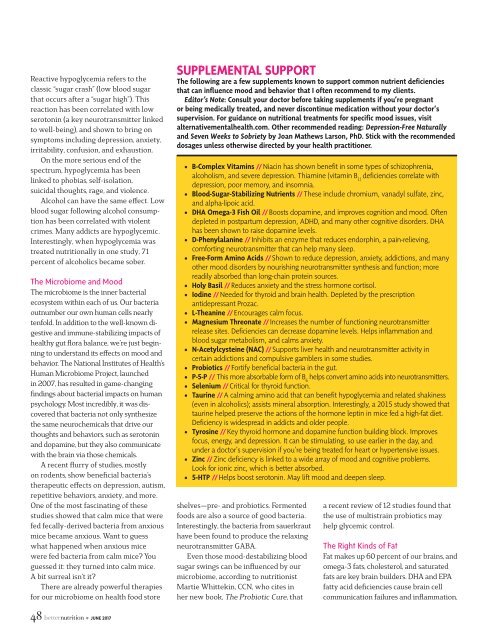Better_Nutrition_June_2017
You also want an ePaper? Increase the reach of your titles
YUMPU automatically turns print PDFs into web optimized ePapers that Google loves.
Reactive hypoglycemia refers to the<br />
classic “sugar crash” (low blood sugar<br />
that occurs after a “sugar high”). This<br />
reaction has been correlated with low<br />
serotonin (a key neurotransmitter linked<br />
to well-being), and shown to bring on<br />
symptoms including depression, anxiety,<br />
irritability, confusion, and exhaustion.<br />
On the more serious end of the<br />
spectrum, hypoglycemia has been<br />
linked to phobias, self-isolation,<br />
suicidal thoughts, rage, and violence.<br />
Alcohol can have the same effect. Low<br />
blood sugar following alcohol consumption<br />
has been correlated with violent<br />
crimes. Many addicts are hypoglycemic.<br />
Interestingly, when hypoglycemia was<br />
treated nutritionally in one study, 71<br />
percent of alcoholics became sober.<br />
The Microbiome and Mood<br />
The microbiome is the inner bacterial<br />
ecosystem within each of us. Our bacteria<br />
outnumber our own human cells nearly<br />
tenfold. In addition to the well-known digestive<br />
and immune-stabilizing impacts of<br />
healthy gut flora balance, we’re just beginning<br />
to understand its effects on mood and<br />
behavior. The National Institutes of Health’s<br />
Human Microbiome Project, launched<br />
in 2007, has resulted in game-changing<br />
findings about bacterial impacts on human<br />
psychology. Most incredibly, it was discovered<br />
that bacteria not only synthesize<br />
the same neurochemicals that drive our<br />
thoughts and behaviors, such as serotonin<br />
and dopamine, but they also communicate<br />
with the brain via those chemicals.<br />
A recent flurry of studies, mostly<br />
on rodents, show beneficial bacteria’s<br />
therapeutic effects on depression, autism,<br />
repetitive behaviors, anxiety, and more.<br />
One of the most fascinating of these<br />
studies showed that calm mice that were<br />
fed fecally-derived bacteria from anxious<br />
mice became anxious. Want to guess<br />
what happened when anxious mice<br />
were fed bacteria from calm mice? You<br />
guessed it: they turned into calm mice.<br />
A bit surreal isn’t it?<br />
There are already powerful therapies<br />
for our microbiome on health food store<br />
SUPPLEMENTAL SUPPORT<br />
The following are a few supplements known to support common nutrient deficiencies<br />
that can influence mood and behavior that I often recommend to my clients.<br />
Editor’s Note: Consult your doctor before taking supplements if you’re pregnant<br />
or being medically treated, and never discontinue medication without your doctor’s<br />
supervision. For guidance on nutritional treatments for specific mood issues, visit<br />
alternativementalhealth.com. Other recommended reading: Depression-Free Naturally<br />
and Seven Weeks to Sobriety by Joan Mathews Larson, PhD. Stick with the recommended<br />
dosages unless otherwise directed by your health practitioner.<br />
• B-Complex Vitamins // Niacin has shown benefit in some types of schizophrenia,<br />
alcoholism, and severe depression. Thiamine (vitamin B 1)<br />
deficiencies correlate with<br />
depression, poor memory, and insomnia.<br />
• Blood-Sugar-Stabilizing Nutrients // These include chromium, vanadyl sulfate, zinc,<br />
and alpha-lipoic acid.<br />
• DHA Omega-3 Fish Oil // Boosts dopamine, and improves cognition and mood. Often<br />
depleted in postpartum depression, ADHD, and many other cognitive disorders. DHA<br />
has been shown to raise dopamine levels.<br />
• D-Phenylalanine // Inhibits an enzyme that reduces endorphin, a pain-relieving,<br />
comforting neurotransmitter that can help many sleep.<br />
• Free-Form Amino Acids // Shown to reduce depression, anxiety, addictions, and many<br />
other mood disorders by nourishing neurotransmitter synthesis and function; more<br />
readily absorbed than long-chain protein sources.<br />
• Holy Basil // Reduces anxiety and the stress hormone cortisol.<br />
• Iodine // Needed for thyroid and brain health. Depleted by the prescription<br />
antidepressant Prozac.<br />
• L-Theanine // Encourages calm focus.<br />
• Magnesium Threonate // Increases the number of functioning neurotransmitter<br />
release sites. Deficiencies can decrease dopamine levels. Helps inflammation and<br />
blood sugar metabolism, and calms anxiety.<br />
• N-Acetylcysteine (NAC) // Supports liver health and neurotransmitter activity in<br />
certain addictions and compulsive gamblers in some studies.<br />
• Probiotics // Fortify beneficial bacteria in the gut.<br />
• P-5-P // This more absorbable form of B 6<br />
helps convert amino acids into neurotransmitters.<br />
• Selenium // Critical for thyroid function.<br />
• Taurine // A calming amino acid that can benefit hypoglycemia and related shakiness<br />
(even in alcoholics); assists mineral absorption. Interestingly, a 2015 study showed that<br />
taurine helped preserve the actions of the hormone leptin in mice fed a high-fat diet.<br />
Deficiency is widespread in addicts and older people.<br />
• Tyrosine // Key thyroid hormone and dopamine function building block. Improves<br />
focus, energy, and depression. It can be stimulating, so use earlier in the day, and<br />
under a doctor’s supervision if you’re being treated for heart or hypertensive issues.<br />
• Zinc // Zinc deficiency is linked to a wide array of mood and cognitive problems.<br />
Look for ionic zinc, which is better absorbed.<br />
• 5-HTP // Helps boost serotonin. May lift mood and deepen sleep.<br />
shelves—pre- and probiotics. Fermented<br />
foods are also a source of good bacteria.<br />
Interestingly, the bacteria from sauerkraut<br />
have been found to produce the relaxing<br />
neurotransmitter GABA.<br />
Even those mood-destabilizing blood<br />
sugar swings can be influenced by our<br />
microbiome, according to nutritionist<br />
Martie Whittekin, CCN, who cites in<br />
her new book, The Probiotic Cure, that<br />
a recent review of 12 studies found that<br />
the use of multistrain probiotics may<br />
help glycemic control.<br />
The Right Kinds of Fat<br />
Fat makes up 60 percent of our brains, and<br />
omega-3 fats, cholesterol, and saturated<br />
fats are key brain builders. DHA and EPA<br />
fatty acid deficiencies cause brain cell<br />
communication failures and inflammation,<br />
!" • JUNE <strong>2017</strong>


















